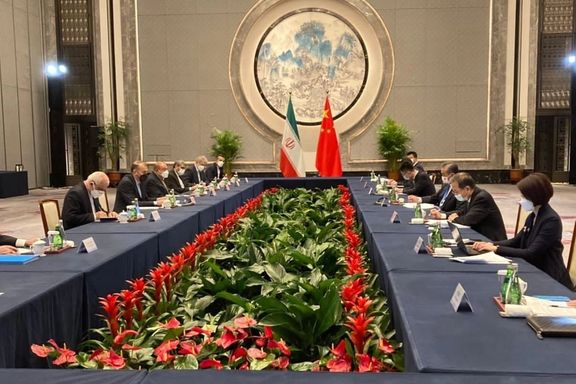China Imports More Iranian Oil Now Than It Did Before Sanctions

China's has boosted Iranian oil imports to record levels in recent months, exceeding a 2017 peak before the US imposed sanctions, tanker tracking data confirms.

China's has boosted Iranian oil imports to record levels in recent months, exceeding a 2017 peak before the US imposed sanctions, tanker tracking data confirms.
Higher imports by China comes amid talks between Tehran and world powers to revive a 2015 nuclear deal that will lift US sanctions on Iranian oil exports. The talks have intensified in recent weeks.
Iran International reported in February that China’s customs grossly underreported its oil imports from Iran.
When the United States imposed full sanctions on Iran’s oil exports in May 2019, China continued to buy 100,000-200,000 bpd until the third quarter of 2020. Before the US presidential elections, reports emerged that Iran was shipping more crude to China and the volume steadily increased, reaching the current levels.
Throughout last year, major American business publications such as The Wall Street Journal and Bloomberg were reporting that China had substantially increased its oil imports from Iran, which could undercut Washington’s leverage in the nuclear talks.
Analysts say the return of Iranian oil will ease tight global supplies and cool crude prices that have touched $100 a barrel following Russia's invasion of Ukraine. But Iran excess production capacity is limited as it is already exporting more than one million barrels per day.
Chinese imports exceeded 700,000 barrels per day (bpd) for January, according to estimates of three tanker trackers, surpassing the 623,000 bpd peak recorded by Chinese customs in 2017 before former US President Donald Trump reimposed sanctions in 2018 on Iranian oil exports.
One tracker estimated imports amounted to 780,000 bpd in November-December on average.
US President Joe Biden's administration has so far chosen not to enforce the sanctions against Chinese individuals and companies amid the negotiations on reviving the 2015 deal.
Record Chinese purchases of Iranian oil would mean less supply will be available to Tehran's previous buyers like Indian and European refiners should the sanctions be removed, traders said according to Reuters.
It would also mean that cheaper Iranian oil will continue to crowd out rival supplies from Brazil and West Africa, they said.
When asked for a comment by Reuters, China's foreign ministry declined to go into details but reiterated that Beijing opposes Washington's long-arm jurisdiction and urges Washington to remove unilateral sanctions.
Iranian officials have boasted in recent weeks that they have substantially increased oil export and defeated US policy of ‘maximum pressure’ imposed by former president Donald Trump.
A US State Department spokesperson said Washington is aware of China's Iranian oil purchases and has broached the subject with Beijing.
“China is an important trading partner for Iran, so, of course, our discussions with China on how best to get a mutual return to compliance with the JCPOA include discussions of sanctions enforcement," said the spokesperson, referring to the 2015 nuclear deal formally known as the Joint Comprehensive Plan of Action.
Demand From Teapots
At the forefront of China's buying are its independent refiners, or "teapots", who, traders said, are being enticed by the discounted prices, especially as their domestic refining margins got pinched under tight regulatory scrutiny.
"We're seeing more plants taking Iranian oil, because they are cheaper," a China-based executive involved in the business told Reuters, referring to the independent refiners.
Traders said January Iranian cargoes were transacted $5 a barrel below benchmark Brent LCOc1. Those prices were steady versus late 2021 but more attractive against competing supply from Brazil that was priced at $7 premium over Brent, they said.
Consulting firm Petro-Logistics, which tracks oil flows, said Iran's crude exports surged in December to over 1 million bpd, the highest level in almost three years.
"Iran's oil exports are mostly going to China, often through convoluted routes and transshipments, with small volumes going to Syria each month," said CEO Daniel Gerber.
Petro-Logistics sees total Iranian oil exports at close to 800,000 bpd in January and 700,000 bpd in February. But OilX, another data analytics firm, pegged Iranian exports at more than 1 million bpd for both January and February.
Iranian officials recently confirmed that they offer discounts to customers.
If the 2015 nuclear deal is revived, Iran is expected to divert sales away from the Chinese independent refiners, but the Islamic republic is unlikely to turn off the tap to these customers, source of more than $20 billion in revenue over the past two years.
"Iran may not have the full confidence how long the new deal could last. Chinese teapots have proven an essential outlet during the worst times and Iran would want to keep that channel open," said the China-based oil sector executive.
With reporting by Reuters